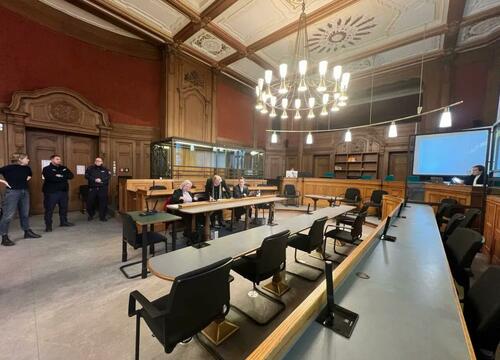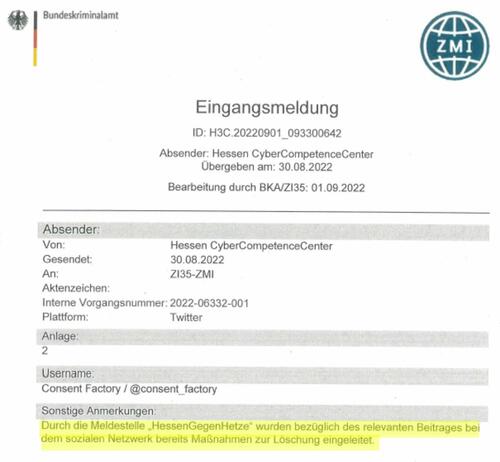
By Matt Taibbi of the Racket News substack
The German people are famous for putting everything in print, even things they shouldn’t, and in this instance at least, American playwright and author CJ Hopkins is glad. “The irony,” he says, laughing. “The Germans, always documenting everything.”
In a letter from the Berlin Prosecutor’s file on Hopkins, the Bundeskriminalamt (BKA, analogous to our FBI) acknowledges receipt of a document from a government office describing an effort to have tweets deleted. “The Hessen Gegen Hetze reporting office,” the highlighted portion reads, “has already initiated measures to delete the relevant post on the social network”:
Hopkins reached out to me after listening in disgust to the Murthy v. Missouri Supreme Court hearing Monday. Standing was a big issue: our government said plaintiffs like Drs. Jay Bhattacharya and Aaron Kheriaty lacked definite proof that the government was responsible for suppressing their speech. No such issue exists in CJ’s case, as you can see.
Hopkins also wanted Americans who might be up in arms about the specter of legalized censorship in their own country to see that the phenomenon has also spread to virtually every Western democracy, often in more extreme forms than we’ve seen so far in the United States.
CJ’s unique insight involves his ludicrous German case, which as you’ll read in the Q&A below has taken bizarre turns since we last checked and will now go to trial yet again. As an expat following the American situation from afar, he’s seen how the authoritarian tide is rising in similar or worse ways all around the globe.
Hopkins is facing the business end of the German version, among the worst. As detailed last June, he was charged with “disseminating propaganda, the contents of which are intended to further the aims of a former National Socialist organization.” The crime? Using a barely detectible Swastika in the cover image of his book, The Rise of the New Normal Reich. Far from “furthering the aims” of Nazism, he was criticizing them by comparing Nazi methods and laws to those of modern health authorities. The offending image:
Hopkins went to trial in January and delivered an impassioned plea to the court. “Every journalist that has covered my case, everyone in this courtroom, understands what this prosecution is actually about,” he said. “It has nothing to do with punishing people who actually disseminate pro-Nazi propaganda. It is about punishing dissent, and making an example of dissidents in order to intimidate others into silence.”
Though the judge was clearly not a fan of Hopkins — a courtroom account by Aya Velázquez, which I recommend reading, described how the judge said CJ’s statements were “ideological drivel,” just “not punishable by law” — he won on the law.
After acquittal, he was made aware that technically the case wasn’t over, because thanks to a quirk of German jurisprudence, the prosecutor had a week to file an appeal. Hopkins was unconcerned. “I doubt he will [re-file]. He made a total fool of himself in front of a large audience yesterday,” he wrote. “I can’t imagine that he will want to do that again.”
Bzzt! Wrong. The prosecutor re-filed charges. The prosecutorial theory in the Hopkins case was based on a bizarre interpretation of hate crime, essentially asserting that if you have to think about an image to realize it’s satire, it can’t be allowed. If that idea spreads, it would make comedy or even sharp commentary impossible. This is why his indictment, and the similar investigation of Roger Waters, are really serious moments. Not to be heavy-handed, but eliminating the loophole for satire or mockery is exactly what Waters meant by “Another Brick in the Wall.” Before you know it, it’ll be too high to see over:
MT: You got charged again?
CJ Hopkins: No… I got acquitted. I went to trial on the 23rd of January, and I wrote this up and I’ll send it to you so you can just look at the whole account. But at the trial I made a big aggressive statement that people republished all over the place. The judge acquitted me, and then called me all kinds of names and then put on her covid mask and stalked out of the courtroom. She called me a Schwurbler, which in German is kind of an idiot, I guess a babbler or someone.
Anyway, I read that statement, which pissed them all off, but she said, “Okay, you’re an idiot, but that’s not against the law, so you’re acquitted.” So I thought, “Great. This is over. I’m acquitted.” The prosecutor had no case whatsoever, and it was really embarrassing, and I figured it was all done, but my attorney reminded me: oh no, the prosecutor can appeal. Which he did. So now I’m facing another trial in appeals court. It’s not new charges, it’s the same charge, but the prosecutor’s appeal of my acquittal.
MT: The double jeopardy thing isn’t big in Germany, I take it?
CJ Hopkins: No.
MT: Are they going to make a different argument?
CJ Hopkins: I have no idea what they’re going to do. They have no argument… I mean, they put my tweets up on an overhead projector, like we were back in high school, and interrogated me about whether the Swastika was on top of the mask or behind the mask, that sort of thing. The prosecutor’s argument was basically, “We don’t believe that Mr. Hopkins is a Nazi, or pro-Nazi, we don’t believe he was trying to spread Nazi propaganda, but he nonetheless spread Nazi propaganda. because his tweet” – and this is a great part of their argument – “because if people saw his tweets, they would have to stop and think for a minute to figure out what they meant.”
MT: Essentially you can’t have satire, because that requires a person to have at least one thought.
CJ Hopkins: You can’t make people think. You’ve got to have beat-you-over-the-head messaging. I think the whole point of this… I’m sure it’s like the plea-bargain thing in the States. They figure if they hit you with a 3,600 Euro fine, you’re going to pay three times that much to fight it in court, so you’re just going to pay the fine and go away. I don’t think they ever expected to end up in court, and I have no idea what the prosecutor is doing with this appeal. The judge a few weeks later submitted a written verdict, which is strongly in my favor. She pretty much reiterated my attorney’s arguments and made it absolutely clear that what I did falls under the exceptions to the statute, and there’s nothing here to prosecute. Nonetheless, the prosecution’s going ahead.
MT: Did you have much Western news coverage?
CJ Hopkins: Right before the trial I had you, then Neue Zürcher Zeitung, which is the big paper of record in Switzerland, and James Kirchick at The Atlantic, who was a big help. I think it put a lot of pressure on the judge. My lawyer made her aware that Germany was being portrayed as a laughingstock in the international press. Aside from The Atlantic, it was all independent alternative media.
MT: In the Murthy Supreme Court case in the States Monday, there was an issue with what they call “traceability.” I see you don’t have a traceability issue, with this document from your case file?
CJ Hopkins: Exactly. That’s why I sent it to you. Unquestionably, this is a government office, directly involved with removing the tweets. The other thing that I was going to say, is that I’m looking at things like the Supreme Court case from a non-U.S. perspective. I’m outside of it. I’m watching the legislation that’s getting rolled out in Ireland and the UK and what’s happening to me here and what’s going on in the States, and it’s so obviously much broader than just a red-blue political story in the US. This is happening throughout the Western democratic countries.
I’m just desperate to get that across to people. I think it’s so easy for people to get locked into what’s going on in their own country and not see the bigger picture.
MT: What’s an example?
CJ Hopkins: There was just a piece in The Herald, in Scotland. The police were being trained there on how to crack down on abusive hate speech. According to this new legislation that’s rolling out and in the training manual, they were saying this could take place in comic performances or stage plays. People are being arrested in the UK for protest signs.
If I can just put one little bug in your head, Matt, to whatever degree you can tweak people and let them know: “Hey, it’s not just Trump and the Democrats and the liberals and the woke people and all that.” This is happening all over the West, in all these different countries. I think that’s one thing that my case does, it provides folks with an opportunity to remind them that this is happening all over. The old rules don’t apply.
MT: Good luck with your case.
CJ Hopkins: Take care.
By Matt Taibbi of the Racket News substack
The German people are famous for putting everything in print, even things they shouldn’t, and in this instance at least, American playwright and author CJ Hopkins is glad. “The irony,” he says, laughing. “The Germans, always documenting everything.”
In a letter from the Berlin Prosecutor’s file on Hopkins, the Bundeskriminalamt (BKA, analogous to our FBI) acknowledges receipt of a document from a government office describing an effort to have tweets deleted. “The Hessen Gegen Hetze reporting office,” the highlighted portion reads, “has already initiated measures to delete the relevant post on the social network”:
Hopkins reached out to me after listening in disgust to the Murthy v. Missouri Supreme Court hearing Monday. Standing was a big issue: our government said plaintiffs like Drs. Jay Bhattacharya and Aaron Kheriaty lacked definite proof that the government was responsible for suppressing their speech. No such issue exists in CJ’s case, as you can see.
Hopkins also wanted Americans who might be up in arms about the specter of legalized censorship in their own country to see that the phenomenon has also spread to virtually every Western democracy, often in more extreme forms than we’ve seen so far in the United States.
CJ’s unique insight involves his ludicrous German case, which as you’ll read in the Q&A below has taken bizarre turns since we last checked and will now go to trial yet again. As an expat following the American situation from afar, he’s seen how the authoritarian tide is rising in similar or worse ways all around the globe.
Hopkins is facing the business end of the German version, among the worst. As detailed last June, he was charged with “disseminating propaganda, the contents of which are intended to further the aims of a former National Socialist organization.” The crime? Using a barely detectible Swastika in the cover image of his book, The Rise of the New Normal Reich. Far from “furthering the aims” of Nazism, he was criticizing them by comparing Nazi methods and laws to those of modern health authorities. The offending image:
Hopkins went to trial in January and delivered an impassioned plea to the court. “Every journalist that has covered my case, everyone in this courtroom, understands what this prosecution is actually about,” he said. “It has nothing to do with punishing people who actually disseminate pro-Nazi propaganda. It is about punishing dissent, and making an example of dissidents in order to intimidate others into silence.”
Though the judge was clearly not a fan of Hopkins — a courtroom account by Aya Velázquez, which I recommend reading, described how the judge said CJ’s statements were “ideological drivel,” just “not punishable by law” — he won on the law.
After acquittal, he was made aware that technically the case wasn’t over, because thanks to a quirk of German jurisprudence, the prosecutor had a week to file an appeal. Hopkins was unconcerned. “I doubt he will [re-file]. He made a total fool of himself in front of a large audience yesterday,” he wrote. “I can’t imagine that he will want to do that again.”
Bzzt! Wrong. The prosecutor re-filed charges. The prosecutorial theory in the Hopkins case was based on a bizarre interpretation of hate crime, essentially asserting that if you have to think about an image to realize it’s satire, it can’t be allowed. If that idea spreads, it would make comedy or even sharp commentary impossible. This is why his indictment, and the similar investigation of Roger Waters, are really serious moments. Not to be heavy-handed, but eliminating the loophole for satire or mockery is exactly what Waters meant by “Another Brick in the Wall.” Before you know it, it’ll be too high to see over:
MT: You got charged again?
CJ Hopkins: No… I got acquitted. I went to trial on the 23rd of January, and I wrote this up and I’ll send it to you so you can just look at the whole account. But at the trial I made a big aggressive statement that people republished all over the place. The judge acquitted me, and then called me all kinds of names and then put on her covid mask and stalked out of the courtroom. She called me a Schwurbler, which in German is kind of an idiot, I guess a babbler or someone.
Anyway, I read that statement, which pissed them all off, but she said, “Okay, you’re an idiot, but that’s not against the law, so you’re acquitted.” So I thought, “Great. This is over. I’m acquitted.” The prosecutor had no case whatsoever, and it was really embarrassing, and I figured it was all done, but my attorney reminded me: oh no, the prosecutor can appeal. Which he did. So now I’m facing another trial in appeals court. It’s not new charges, it’s the same charge, but the prosecutor’s appeal of my acquittal.
MT: The double jeopardy thing isn’t big in Germany, I take it?
CJ Hopkins: No.
MT: Are they going to make a different argument?
CJ Hopkins: I have no idea what they’re going to do. They have no argument… I mean, they put my tweets up on an overhead projector, like we were back in high school, and interrogated me about whether the Swastika was on top of the mask or behind the mask, that sort of thing. The prosecutor’s argument was basically, “We don’t believe that Mr. Hopkins is a Nazi, or pro-Nazi, we don’t believe he was trying to spread Nazi propaganda, but he nonetheless spread Nazi propaganda. because his tweet” – and this is a great part of their argument – “because if people saw his tweets, they would have to stop and think for a minute to figure out what they meant.”
MT: Essentially you can’t have satire, because that requires a person to have at least one thought.
CJ Hopkins: You can’t make people think. You’ve got to have beat-you-over-the-head messaging. I think the whole point of this… I’m sure it’s like the plea-bargain thing in the States. They figure if they hit you with a 3,600 Euro fine, you’re going to pay three times that much to fight it in court, so you’re just going to pay the fine and go away. I don’t think they ever expected to end up in court, and I have no idea what the prosecutor is doing with this appeal. The judge a few weeks later submitted a written verdict, which is strongly in my favor. She pretty much reiterated my attorney’s arguments and made it absolutely clear that what I did falls under the exceptions to the statute, and there’s nothing here to prosecute. Nonetheless, the prosecution’s going ahead.
MT: Did you have much Western news coverage?
CJ Hopkins: Right before the trial I had you, then Neue Zürcher Zeitung, which is the big paper of record in Switzerland, and James Kirchick at The Atlantic, who was a big help. I think it put a lot of pressure on the judge. My lawyer made her aware that Germany was being portrayed as a laughingstock in the international press. Aside from The Atlantic, it was all independent alternative media.
MT: In the Murthy Supreme Court case in the States Monday, there was an issue with what they call “traceability.” I see you don’t have a traceability issue, with this document from your case file?
CJ Hopkins: Exactly. That’s why I sent it to you. Unquestionably, this is a government office, directly involved with removing the tweets. The other thing that I was going to say, is that I’m looking at things like the Supreme Court case from a non-U.S. perspective. I’m outside of it. I’m watching the legislation that’s getting rolled out in Ireland and the UK and what’s happening to me here and what’s going on in the States, and it’s so obviously much broader than just a red-blue political story in the US. This is happening throughout the Western democratic countries.
I’m just desperate to get that across to people. I think it’s so easy for people to get locked into what’s going on in their own country and not see the bigger picture.
MT: What’s an example?
CJ Hopkins: There was just a piece in The Herald, in Scotland. The police were being trained there on how to crack down on abusive hate speech. According to this new legislation that’s rolling out and in the training manual, they were saying this could take place in comic performances or stage plays. People are being arrested in the UK for protest signs.
If I can just put one little bug in your head, Matt, to whatever degree you can tweak people and let them know: “Hey, it’s not just Trump and the Democrats and the liberals and the woke people and all that.” This is happening all over the West, in all these different countries. I think that’s one thing that my case does, it provides folks with an opportunity to remind them that this is happening all over. The old rules don’t apply.
MT: Good luck with your case.
CJ Hopkins: Take care.
Loading…







